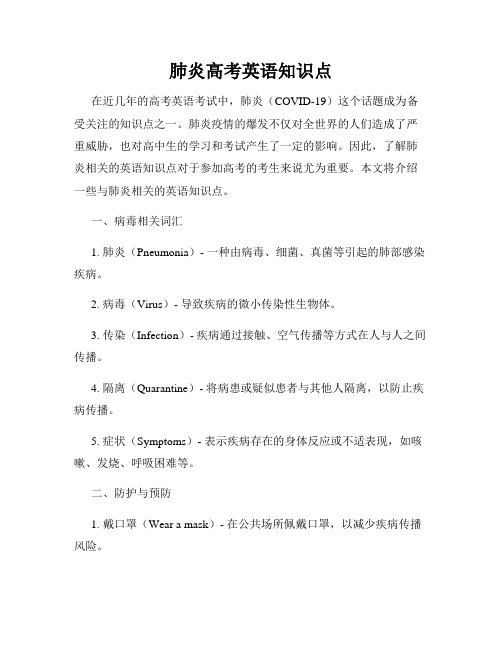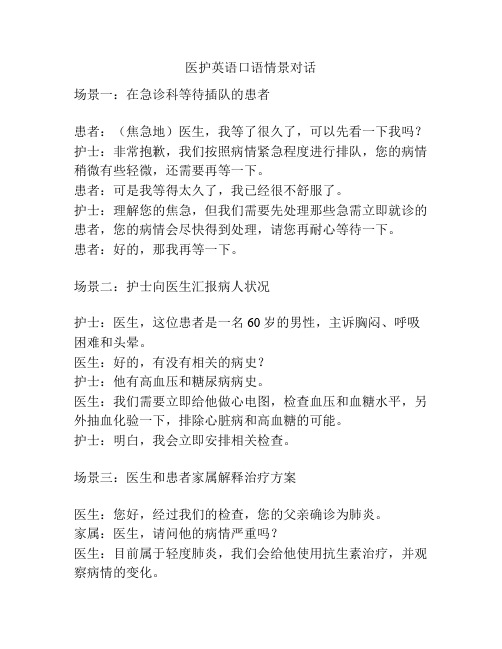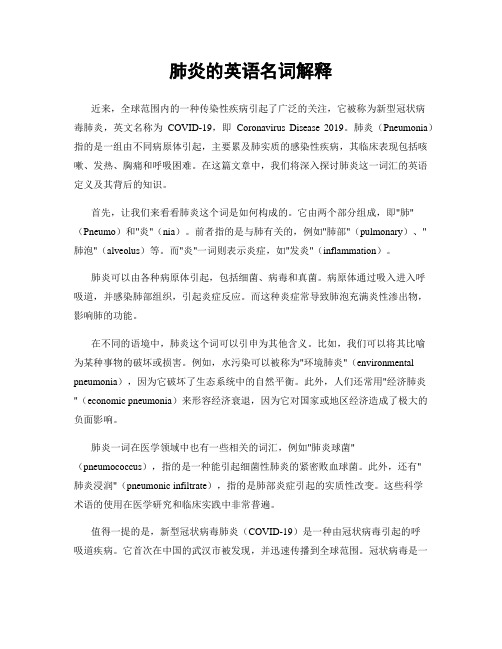医学英语口语:肺炎
医务英语之肺炎常识

医务英语之肺炎常识On a simple level, pneumonia is an infection of the lungs. It is treatable and preventable but was responsible for nearly one million deaths in 2015. It is the leading cause of death among children under five around the world.简单来说,肺炎就是一种肺部的感染。
这种疾病可治疗、可预防,但是在2015年就造成了近100万人死亡。
肺炎也是世界范围内五岁以下儿童死亡的主要原因。
It is most often caused by the Streptococcus pneumoniae bacteria, but viruses like the flu, and even fungi also cause the disease.肺炎通常由肺炎链球菌引起,也会由类似流感病毒的病毒引起,甚至真菌也会引发肺炎。
Once it gets in a pe rson’s lungs, the alveoli, or air sacs that take in oxygen, swell and fill up with fluid. This makes breathing difficult and painful, and can also limit the amount of oxygen a person takes into their body with each breath. It also causes fever, chills and coughing.一旦病原体进入肺部,肺泡(类似吸入氧气的气囊)就会肿胀并充满积液。
这使呼吸变得困难且痛苦,并且会限制每次呼吸时进入人体的氧气量。
最新医生询问病症的英语口语

【篇一】医生询问病症的英语口语1.What's the matter with you?你哪里不舒服?(也可以这样说:What’s your trouble?)2.I have a terrible toothache.我牙疼得厉害。
3.Tell me how it got started.告诉我怎么回事。
4.Yesterday I had a runny nose.昨天我第流鼻涕。
5.Now my nose is stuffed up.现在有点鼻塞。
6.I have a sore throat.我喉咙很痛。
7.I began to run a fever.我开始发烧了。
8.By the way, do you have a history of tuberculosis? 顺便问一下,你曾经患过肺结核吗?9.I've been feeling a little nauseous.我一直想吐。
10.I feel pain here whenever I drink something cold. 我一喝冷的东西这里就觉得痛。
11.I feel dizzy.我头晕目眩。
12.My tooth is killing me.我的牙痛死了。
13.I have a stabbing pain.我感到像针扎似地疼。
14.I don’t have much of an appetite these days.这些天来我没什么食欲。
15.It’s a sharp pain like some one is sticking a needle in my tooth. 是刺痛的感觉,就好像有人把针刺进我的牙里一样。
【篇二】医生诊断结果的英语口语1.The two doctors made different diagnoses of your disease.两位医生对你的病下了不同的诊断结论。
2.The doctor diagnosed the tumor as benign.医生诊断肿瘤是良性的。
西医感染科、儿科术语英文翻译

西医感染科术语英文翻译以下是常见的西医感染科术语英文翻译:1. 病毒感染:Viral Infection2. 细菌感染:Bacterial Infection3. 真菌感染:Fungal Infection4. 寄生虫感染:Parasitic Infection5. 支原体感染:Mycoplasma Infection6. 立克次体感染:Rickettsial Infection7. 衣原体感染:Chlamydial Infection8. 性传播感染:Sexually Transmitted Infections (STIs)9. 医院获得性感染:Hospital-Acquired Infections (HAIs)10. 社区获得性感染:Community-Acquired Infections (CAIs)11. 抗药性感染:Antibiotic-Resistant Infections12. 病毒性肝炎:Viral Hepatitis13. 细菌性痢疾:Bacterial Dysentery14. 结核病:Tuberculosis (TB)15. 破伤风:Tetanus16. 梅毒:Syphilis17. 性病性淋巴肉芽肿:Lymphogranuloma Venereum (LGV)18. 人乳头瘤病毒感染:Human Papillomavirus (HPV) Infection19. 钩端螺旋体病:Leptospirosis20. 疟疾:Malaria21. 阿米巴病:Amoebiasis22. 弓形虫病:Toxoplasmosis23. 细菌性食物中毒:Bacterial Food Poisoning24. 病毒性心肌炎:Viral Myocarditis25. 流行性感冒:Influenza (Flu)26. 登革热:Dengue Fever27. 黄热病:Yellow Fever28. 脑膜炎:Meningitis29. 败血症:Septicemia30. 脓毒症:Sepsis31. 脓肿:Abscess32. 发热待查:Fever of Unknown Origin (FUO)33. 抗生素治疗:Antibiotic Therapy34. 对症治疗:Symptomatic Treatment35. 免疫疗法:Immunotherapy36. 支持性护理:Supportive Care37. 隔离措施:Isolation Measures38. 预防接种:Vaccination39. 手卫生:Hand Hygiene40. 环境清洁消毒:Environmental Cleaning and Disinfection41. 传染病监测与控制:Infectious Disease Surveillance and Control42. 人免疫缺陷病毒(HIV)感染:Human Immunodeficiency Virus (HIV) Infection43. 人乳头瘤病毒疫苗(HPV疫苗):Human Papillomavirus Vaccine (HPV vaccine)44. 克林霉素抗药性检测:Clindamycin Resistance Testing45. 卡介苗接种(BCG接种):Bacillus Calmette-Guérin (BCG) Vaccination46. 内毒素检测(Endotoxin Detection):Endotoxin Testing (LPS Testing)47. 白喉抗毒素治疗(Diphtheria Antitoxin):Diphtheria Antitoxin Therapy (DAT)48. 结核病预防性治疗(TB Preventive Therapy):TB Preventive Therapy (TPT)49. 人畜共患病(Zoonoses):Zoonoses (Animal-borne Diseases)50. 人畜共患病预防和控制(Zoonosis Prevention and Control):Zoonosis Prevention and Control西医儿科术语英文翻译以下是常见的西医儿科术语英文翻译:1. 儿科:Pediatrics2. 儿童生长发育:Child Growth and Development3. 新生儿:Neonate4. 婴儿:Infant5. 学龄前儿童:Preschool Child6. 学龄儿童:School-aged Child7. 青春期:Adolescence8. 儿童营养:Child Nutrition9. 母乳喂养:Breastfeeding10. 配方奶喂养:Formula Feeding11. 断奶:Weaning12. 幼儿急疹:玫瑰疹:Rubella13. 水痘:Varicella14. 手足口病:Hand-foot-mouth Disease (HFMD)15. 流行性感冒:Influenza16. 中耳炎:Otitis Media17. 急性上呼吸道感染:Acute Upper Respiratory Infection (URI)18. 支气管肺炎:Bronchopneumonia19. 支原体肺炎:Mycoplasma Pneumonia20. 百日咳:Pertussis21. 儿童哮喘:Asthma in Children22. 过敏性鼻炎:Allergic Rhinitis23. 肠道寄生虫病:Intestinal Parasitic Diseases24. 微量元素缺乏症:Trace Element Deficiency25. 维生素缺乏症:Vitamin Deficiency26. 新生儿黄疸:Neonatal Jaundice27. 新生儿窒息:Neonatal Asphyxia28. 新生儿败血症:Neonatal Sepsis29. 肠套叠:Intussusception30. 小儿肺炎:Pneumonia in Children31. 小儿腹泻病:Diarrhea in Children32. 小儿营养不良:Malnutrition in Children33. 小儿肥胖症:Childhood Obesity34. 小儿糖尿病:Diabetes Mellitus in Children35. 小儿先天性心脏病:Congenital Heart Disease in Children36. 风湿热:Rheumatic Fever37. 川崎病:Kawasaki Disease38. 幼年特发性关节炎:Juvenile Idiopathic Arthritis (JIA)39. 儿科重症监护病房(PICU):Pediatric Intensive Care Unit (PICU)40. 新生儿重症监护病房(NICU):Neonatal Intensive Care Unit (NICU)41. 儿童生长发育评估:Child Growth Assessment42. 儿童免疫接种计划:Child Immunization Schedule43. 儿童心理咨询与治疗:Child Psychological Counseling and Therapy44. 儿童康复治疗:Child Rehabilitation Therapies45. 儿童行为问题咨询与治疗:Child Behavioral Issues Counseling and Therapy46. 儿童疫苗接种咨询与指导:Child Vaccination Counseling and Guidance47. 新生儿筛查项目:Neonatal Screening Programs48. 小儿危重症管理技术:Critical Care Management in Children49. 儿科药理学和药物治疗学:Pediatric Pharmacology and Therapeutics50. 小儿外科手术技术:Pediatric Surgical Techniques。
肺炎英文版

Thought
Clinical manifestation
Pulmonary consolidation with typical signs, such as enhanced, fremitus percussion dullness and bronchial breath sounds, can also be heard and rales. Pleural effusion, ipsilateral chest percussion dullness, diminished breath sounds.
We can see, the patient's condition has improved, but there is no obvious improvement in imaging, This is characteristic of aspiration pneumonia, pulmonary lesions difficult to absorb, Patients with low immunity, easy recurrence of pneumonia So, the patients with recurrent pneumonia, so he has to stay in the hospitalDifferentialFra bibliotekdiagnosis
1, Pulmonary tuberculosis Many symptoms of systemic poisoning, afternoon fever, night sweats, fatigue, weakness, weight loss, insomnia, heart palpitations and other symptoms. X-ray visible lesions in the apical or supraclavicular, uneven density, dissipated slowly, and can form a cavity or intrapulmonary spread. Mycobacterium tuberculosis can be found in the sputum. The conventional antibiotic therapy.
肺炎高考英语知识点

肺炎高考英语知识点在近几年的高考英语考试中,肺炎(COVID-19)这个话题成为备受关注的知识点之一。
肺炎疫情的爆发不仅对全世界的人们造成了严重威胁,也对高中生的学习和考试产生了一定的影响。
因此,了解肺炎相关的英语知识点对于参加高考的考生来说尤为重要。
本文将介绍一些与肺炎相关的英语知识点。
一、病毒相关词汇1. 肺炎(Pneumonia)- 一种由病毒、细菌、真菌等引起的肺部感染疾病。
2. 病毒(Virus)- 导致疾病的微小传染性生物体。
3. 传染(Infection)- 疾病通过接触、空气传播等方式在人与人之间传播。
4. 隔离(Quarantine)- 将病患或疑似患者与其他人隔离,以防止疾病传播。
5. 症状(Symptoms)- 表示疾病存在的身体反应或不适表现,如咳嗽、发烧、呼吸困难等。
二、防护与预防1. 戴口罩(Wear a mask)- 在公共场所佩戴口罩,以减少疾病传播风险。
2. 勤洗手(Wash hands frequently)- 使用肥皂和流动水洗手,消灭手上的病毒。
3. 保持社交距离(Maintain social distancing)- 尽量保持1米以上的距离,减少接触感染的可能性。
4. 避免触摸面部(Avoid touching face)- 避免用手触摸、揉搓眼睛、口鼻等易感染的部位。
5. 预防措施(Preventive measures)- 指采取的预防疾病的措施,如做好个人卫生、定期清洁环境等。
三、肺炎疫苗1. 疫苗(Vaccine)- 预防传染病的一种生物制剂,通过注射等方式进行接种。
2. 研发(Develop)- 开发新的药物或疫苗。
3. 批准(Approval)- 表示疫苗已经获得官方批准,可以使用。
4. 接种(Vaccination)- 将疫苗注射到人体以建立免疫防御。
四、科学研究1. 病毒溯源(Virus tracing)- 通过追踪调查确定病毒起源和传播途径。
医护英语口语情景对话

医护英语口语情景对话
场景一:在急诊科等待插队的患者
患者:(焦急地)医生,我等了很久了,可以先看一下我吗?护士:非常抱歉,我们按照病情紧急程度进行排队,您的病情稍微有些轻微,还需要再等一下。
患者:可是我等得太久了,我已经很不舒服了。
护士:理解您的焦急,但我们需要先处理那些急需立即就诊的患者,您的病情会尽快得到处理,请您再耐心等待一下。
患者:好的,那我再等一下。
场景二:护士向医生汇报病人状况
护士:医生,这位患者是一名60岁的男性,主诉胸闷、呼吸困难和头晕。
医生:好的,有没有相关的病史?
护士:他有高血压和糖尿病病史。
医生:我们需要立即给他做心电图,检查血压和血糖水平,另外抽血化验一下,排除心脏病和高血糖的可能。
护士:明白,我会立即安排相关检查。
场景三:医生和患者家属解释治疗方案
医生:您好,经过我们的检查,您的父亲确诊为肺炎。
家属:医生,请问他的病情严重吗?
医生:目前属于轻度肺炎,我们会给他使用抗生素治疗,并观察病情的变化。
家属:需要住院吗?
医生:考虑到他的病情和年龄,我们建议他住院观察,确保及时处理任何可能的并发症。
家属:好的,谢谢医生。
场景四:医生向护士交接病人情况
医生:护士,这位患者病情已经稳定,可以转到一般病房继续观察和治疗。
护士:明白,我会协助安排病房转移和医嘱的整理。
医生:另外,他还需要每日监测体温、血压和心率,记得及时记录并报告异常情况。
护士:好的,我会密切关注他的生命体征,并及时向您汇报。
肺炎的英语名词解释

肺炎的英语名词解释近来,全球范围内的一种传染性疾病引起了广泛的关注,它被称为新型冠状病毒肺炎,英文名称为COVID-19,即Coronavirus Disease 2019。
肺炎(Pneumonia)指的是一组由不同病原体引起,主要累及肺实质的感染性疾病,其临床表现包括咳嗽、发热、胸痛和呼吸困难。
在这篇文章中,我们将深入探讨肺炎这一词汇的英语定义及其背后的知识。
首先,让我们来看看肺炎这个词是如何构成的。
它由两个部分组成,即"肺"(Pneumo)和"炎"(nia)。
前者指的是与肺有关的,例如"肺部"(pulmonary)、"肺泡"(alveolus)等。
而"炎"一词则表示炎症,如"发炎"(inflammation)。
肺炎可以由各种病原体引起,包括细菌、病毒和真菌。
病原体通过吸入进入呼吸道,并感染肺部组织,引起炎症反应。
而这种炎症常导致肺泡充满炎性渗出物,影响肺的功能。
在不同的语境中,肺炎这个词可以引申为其他含义。
比如,我们可以将其比喻为某种事物的破坏或损害。
例如,水污染可以被称为"环境肺炎"(environmental pneumonia),因为它破坏了生态系统中的自然平衡。
此外,人们还常用"经济肺炎"(economic pneumonia)来形容经济衰退,因为它对国家或地区经济造成了极大的负面影响。
肺炎一词在医学领域中也有一些相关的词汇,例如"肺炎球菌"(pneumococcus),指的是一种能引起细菌性肺炎的紧密败血球菌。
此外,还有"肺炎浸润"(pneumonic infiltrate),指的是肺部炎症引起的实质性改变。
这些科学术语的使用在医学研究和临床实践中非常普遍。
值得一提的是,新型冠状病毒肺炎(COVID-19)是一种由冠状病毒引起的呼吸道疾病。
基础医学英语口语6-Pneumonia

Pneumonia肺炎Introduction介绍Pneumonia is an inflammation and infection of the lungs. Every year, more than 60,000 Americans die of pneumonia. It can affect any body, but is more dangerous to older adults, infants, and patients with chronic illnesses.Pneumonia:[nju(:)5mEu]n.[医] 肺炎。
单词中首字母p不发音,pneu-表示“气流”,pneumal的意思是“肺的”,-a在医学英语中表示“疾病”;Inflammation:[7inflE5meiFEn]n. 炎症,发炎。
In-表示“处于……状态”,flame表示“火苗”,-ation是动词转换成名词的后缀;Infection:[in5fekFEn]n.[医] 传染,感染;Chronic:[5krCnik]adj.慢性的,其反义词为acute,急性的。
Preventing pneumonia is always better than treating it. If you do get pneumonia, recognizing its symptoms and treating it early offers the best chance for recovery.Recovery:恢复,治愈。
Pneumonia is an inflammation of the lung. Inflammation is the immune system's normal response to contaminants or injury. Germs such as bacteria or viruses cause inflammation.Contaminant: [kEn5tAminEnt]n.致污物,污染物,源于动词contaminate,污染;Injury:[5indVEri]n.外伤;Germ:[dVE:m]n.微生物, 细菌;Bacteria:[bAk5tiEriE]n.细菌,用作复数,单数形式是bacterium;Virus:[5vaiErEs]n.病毒。
- 1、下载文档前请自行甄别文档内容的完整性,平台不提供额外的编辑、内容补充、找答案等附加服务。
- 2、"仅部分预览"的文档,不可在线预览部分如存在完整性等问题,可反馈申请退款(可完整预览的文档不适用该条件!)。
- 3、如文档侵犯您的权益,请联系客服反馈,我们会尽快为您处理(人工客服工作时间:9:00-18:30)。
医学英语口语:肺炎
pneumonia
alternative names
pneumonitis; bronchopneumonia; community-acquired pneumonia
definition
pneumonia is an inflammation of the lungs caused by an infection. many different organisms can cause it, including bacteria, viruses, and fungi.
pneumonia is a common illness that affects millions of people each year in the united states.
pneumonia can range from mild to severe, even fatal. the severity depends on the type of organism causing pneumonia as well as your age and underlying health.
causes, incidence, and risk factors
bacterial pneumonias tend to be the most serious and, in adults, the most common cause, especially streptococcus pneumoniae (pneumococcus).
respiratory viruses are the most common causes of pneumonia in young children, peaking between the ages of 2 and 3. by school age, the bacterium mycoplasma pneumoniae becomes more common.
in some people, particularly the elderly and those who are debilitated, bacterial pneumonia may follow influenza or even a common cold.
many people contract pneumonia while staying in a hospital for other conditions. this tends to be more serious because the patient's immune system is often impaired due to the condition that initially required treatment. in addition, there is a greater possibility of infection with bacteria
that are resistant to antibiotics.
see also:
· aspiration pneumonia
· atypical pneumoniacmv pneumonia
· hospital-acquired pneumonia
· legionella pneumonia
· pneumocystis carinii pneumonia
· pneumonia in immunocompromised host
· viral pneumonia
· walking pneumonia
symptoms
the main symptoms of pneumonia are:
· cough with greenish or yellow mucus; bloody sputum happens on occasion
· fev er with shaking chills
· sharp or stabbing chest pain worsened by deep breathing or coughing
· rapid, shallow breathing
· shortness of breathadditional symptoms include:
· headache
· excessive sweating and clammy skin
· loss of appetite
· excessive fatigue
· confusion in older people
signs and tests
if you have pneumonia, you may be working hard to breathe, or may be breathing fast. crackles are heard when listening to your chest with a stethoscope. other abnormal breathing sounds may also be heard through the stethoscope or via percussion (tapping on your chest wall).
the following tests may show signs of pneumonia:
· chest x-ray
· gram's stain and culture of your sputum to look for the organism causing your symptoms
· cbc to check white blood cell count; if high, this suggests bacterial infection
· arterial blood gases to check how well you are oxygenating your blood
· thoracic ct。
